Apocalypse Iran: MAGA Boots to Tehran?
Will the initial rush of geopolitical dopamine that bombing Iran delivers give way to the grim reality of a prolonged, costly war of attrition with no US exit strategy in sight?
Iran, the latest target in more than two decades of Israeli-American regime change operations, is no easy prey. This is a vast, mountainous nation guarding a proud and ancient civilization—one not easily broken by either conventional bombing campaigns. While President Trump offers soothing words about a “limited” intervention aimed at halting Iran’s nuclear program, the reality is far more volatile. The moment Iran retaliates to overt US aggression—by sinking a US ship, striking bases across the region, or launching sabotage and assassination operations through America’s porous borders—mission creep becomes inevitable.
What begins as a precision airstrike ends with a World War II–scale invasion, and with no viable proxy force, it will be MAGA boots on the ground doing the dying.
In response to Israeli aggression, Iran appears to have already launched its own campaign to demilitarize Israel. Its strategic missile strikes have targeted the nerve centers of Israeli military power, though Israeli censorship laws mean the full extent of the damage remains unclear. On June 19th, however, that blackout was briefly lifted: a military hospital and the Tel Aviv Stock Exchange were struck. Iran claims to have hit key Israeli military command sites, including the IDF’s Military Intelligence Center in Gav-Yam and its Cyber Command HQ. Whether those claims are true or exaggerated, the images will be enough to stoke war fever in Washington.
At this stage, both sides are locked in a war of attrition fought through airpower and sabotage. Neither has the means to invade the other, though Mossad has deployed a network of saboteurs across Iran, bombing police stations and critical infrastructure in what appears to be an effort to spark a domestic revolt. Perhaps Israel dreams of American and Israeli troops parading through Tehran, met with flowers and applause. But dreams aside, the Iran-Israel War is a grinding stalemate—and that’s where US involvement comes in.
President Trump has announced he will make a decision on intervention within two weeks—which, in the cynical language of Washington, means the bombs start falling fifteen minutes after markets close on Friday!
Bombing is the easy part, the gateway drug of geopolitics. It gives pundits and politicians a quick, potent hit of strategic dopamine. But Iran isn’t likely to fold just because a few bombs are falling. Gaza hasn’t. Ukraine hasn’t. There will be no white flags flaying over Tehran any time soon, although Trump is certain to deploy a plethora of “Mission Accomplished” banners through his Truth postings.
Once the bombing begins, the retaliation will come in waves. US bases across the region will burn. Perhaps also Saudi oil infrastructure will also go up in flames. Iran will close the Strait of Hormuz with mines laid by special forces, choking global oil shipments and throwing the world economy into chaos. Inflation will spike, growth will collapse, and America’s global rivals—China, Russia, and others—will quietly supply Tehran with arms, intelligence, and money, just as the US and Europe once did for Ukraine.
If Netanyahu is serious about regime change—and let’s not pretend otherwise—he’s going to need ground troops—a lot of them. Israel’s army is exhausted from two years in Gaza, and European militaries aren’t fit for anything more than photo-ops. That leaves one option: American soldiers. And after all, what price is too high for GI Joe to pay to prevent another Holocaust?
But it won’t be Ivy League grads or blue-state technocrats with pronouns in their bios marching into Persia. It’ll be MAGA kids—working-class Americans whose fathers thought they voted against forever wars, not into one. The same people who once shouted “No more wars for Israel” may soon find themselves bleeding out on the slopes of the Zagros Mountains, while pundits in D.C. sip cocktails and mock their naiveté.
Seeking to protect MAGA partisans from a Persian slaughter, a strong anti-war faction has emerged on the right. Peaceniks include Tucker Carlson, Steve Bannon, Alex Jones, Marjorie Taylor Greene, and Jack Posobiec have all spoken out against America acting as Israel’s military proxy. Matt Gaetz, Trump’s original pick for US Attorney General, has even floated the once-taboo idea that Israel should be denuclearized to promote stability in the Middle East.
Meanwhile, China and Russia will sit back and watch. Iran is a key node in China’s Belt and Road Initiative and Beijing buys Iranian oil at bargain basement prices thanks to American sanctions; there’s no chance Beijing lets it fall without a fight. The Chinese have already banned rare earth exports vital to the US military. American stockpiles are already depleted after three years of funnelling weapons to Ukraine and two years of arming Israel in Gaza. When it comes time for “Operation Iranian Freedom,” the Pentagon may discover it simply doesn’t have the gear to fight it for very long and few exit paths to leave the conflict with US honour intact—although it is the genius of President Trump to mould even the worst outcomes into apparent victories.
Air Power Alone
The notion that airpower alone can bring Iran to its knees is a fantasy recycled from failed campaigns past. From Korea to Vietnam, and more recently in Iraq, Libya, and Gaza, we’ve seen the limits of bombing. It can maim and disorient, but it rarely delivers regime change. In Iraq, both in 1991 and 2003, airstrikes were only effective because they preceded or accompanied full-scale invasions. Even NATO’s 1999 bombing of Serbia—often touted as a successful air war—only worked under the threat of a ground invasion and after intense diplomatic pressure.
Israel’s own experiences make this case even clearer. Its 2006 war on Hezbollah achieved little despite weeks of airstrikes. Its repeated assaults on Gaza—including the current one—have reduced much of the strip to rubble, yet failed to eliminate Hamas or win a stable post-war settlement. Israel’s ongoing campaign in Gaza is a strategic failure cloaked in tactical brutality. The idea that Iran—a nation of 90 million with an experienced military, a proud national identity, and a history of endurance in the face of war—will fold under air pressure alone is delusional.
This is not a country that breaks easily. Iran weathered an eight-year war with Saddam Hussein, enduring chemical attacks, immense casualties, and economic siege. And unlike Iraq or Libya, it has allies, industrial capacity, and geographic depth. If regime change is the real goal—and it’s clear from Netanyahu’s rhetoric that it is—then bombing won’t suffice. It will take a ground invasion. Israel won’t do it. It can’t. That burden would fall to the United States.
Fortress Iran
Iran is a geographic fortress. Natural barriers abound: rugged mountain chains, two vast deserts, and narrow passes that choke off access from nearly every side. An eastern approach from Afghanistan involves navigating desolate terrain with few staging points. A western approach, via Turkey, is politically improbable. Ankara refused to let the US use Turkish territory for the 2003 invasion of Iraq—and US–Turkey relations have only deteriorated since then. Besides, once Tehran were out of the way, Israel would turn its gun sights on Turkey.
The southern route—the one Saddam attempted—offers no easier path. The confluence of the Tigris and Euphrates forms a swampy bottleneck easily defended by entrenched forces. Beyond it lie the Zagros Mountains, which chewed up Saddam’s military for eight fruitless years.
Any serious ground campaign would require overwhelming numbers. One military estimate suggests as many as 1.6 million troops would be needed to seize and occupy Iran—far beyond the 180,000 the US deployed at the height of the Iraq War, and well beyond America’s current capacity to house or supply such a force in the region.
The Human Cost and the Political Trap
The casualties would be catastrophic. A campaign to forcibly remove Iran’s leadership could kill not thousands, but millions. Urban warfare in cities like Tehran or Mashhad would make Fallujah look like a warm-up drill. And unlike Iraq, there would be no illusion of a “coalition of the willing.” No European power wants to bleed for Netanyahu’s war.
And yet, bizarrely, the diplomatic option has been allowed to rot on the vine. A “deal” to de-escalate is now politically impossible. Israel has no interest in such a deal—it has, in fact, systematically eliminated much of Iran’s nuclear negotiating team. The US, meanwhile, has rendered itself agreement incapable. Trump tore up the 2015 nuclear agreement negotiated under Obama, then demanded Iran continue to follow its terms. It remains a mystery why Tehran’s boomer leadership ever returned to the table after that betrayal. Perhaps the lure of selling their oil at market prices instead of supplying it so cheaply to Beijing?
Strategic Depth and Realignment
Despite its resilience, Iran is not without flaws. The revolutionary leadership suffers from stagnation. Its gerontocratic elite, marinated in martyrdom ideology, clings to outdated tools—WhatsApp, reportedly compromised by Mossad, was still widely used by Iranian officials until very recently. But even Mossad’s assassinations may have unintended consequences: thinning the aging ranks and making room for a younger, more capable generation of Iranian leadership—one that is more open to outside assistance.
Iran has long feared becoming anyone’s pawn. It kept its distance from both China and Russia, and even flirted briefly with India—a relationship now under stress as Indian-descended IT contractors are alleged to be serving as Mossad assets deep within Iran’s state infrastructure. But if this war escalates, that strategic aloofness will vanish. Iran will have no choice but to deepen its ties with Beijing, Moscow—and perhaps even Islamabad.
Yes, there are contradictions in a Pakistan–Iran alliance. But for Pakistan, realism will triumph over ideology. It will not want a Zionist client state planted on its western border. Humiliation and survival are powerful motivators. In war, Iran will be forced to overcome its internal contradictions, because what awaits it otherwise is far worse.
The Nuclear Question: Totem and Taboo
At the heart of current US-Israeli war planning lies Iran’s nuclear infrastructure—especially the heavily fortified Fordow Fuel Enrichment Plant, buried deep within a mountain near the city of Qom. Fordow is no longer just a facility—it’s a totem. A symbol of Iran’s nuclear sovereignty, buried deep within the mountains not just for protection, but for reverence. It stands for national pride, self-determination, and the unyielding will to survive in a hostile geopolitical landscape. It is both real and mythic: a physical site and a symbolic one, housing not just centrifuges, but narratives of martyrdom, resistance, and deterrence.
To destroy Fordow is not merely to strike a technical target. It is to desecrate a totem—to symbolically neuter the Iranian state, to humiliate it before the world, to proclaim that no depth is safe, no sovereignty sacred. For the war planners in Tel Aviv and Washington, the fantasy runs deeper still: to strike like Yahweh into the heart of the mountain, to send divine fire crashing through rock and reinforced steel, obliterating not just uranium but the very idea of resistance. But this is a messianic delusion. Iran’s enriched uranium is likely long gone, dispersed or duplicated, and what remains at Fordow is more myth than matter—an empty altar, awaiting a sacrificial bomb.
To breach this nuclear fortress, the Pentagon has considered deploying its most powerful non-nuclear weapon—the GBU-57 Massive Ordnance Penetrator (MOP). This 30,000-pound gravity bomb was engineered to punch through reinforced bunkers, but even MOP has limits. Fordow’s depth and surrounding terrain—granite, layered concrete, and high-altitude geography—make it almost impossible to reach without multiple sequential hits in precisely the same spot, a task rendered virtually impossible by gravity-based delivery systems alone.
The unpleasant truth is this: no conventional weapon can guarantee the destruction of Fordow. And so the taboo rears its head.
Breaking the Nuclear Taboo?
In classified war game scenarios and increasingly in semi-public statements, US military planners and hawkish think tanks have floated the idea of using tactical nuclear weapons to ensure destruction of hardened Iranian sites. That’s where the real danger begins—not to Iran alone, but to the global system. Because once a nuclear weapon is used, no matter how "small" or "surgical," the nuclear taboo is shattered. The last barrier to total war collapses.
This taboo is not law, but it is real. It has governed behaviour since 1945—not through treaties, but through norms, shame, deterrence, and the deeply internalized fear of opening Pandora’s Box. As political scientist Nina Tannenwald has documented, even during moments of extreme geopolitical stress—Korea, Vietnam, Cuba, the Gulf War—states with nuclear capacity held back, constrained by a moral and strategic logic that defied pure military calculus.
To violate that taboo, even “just a little,” would unleash incalculable consequences. Russia, Pakistan, India, North Korea, and China might interpret it as a green light to use their own tactical nukes in regional conflicts. Iran would gain immense moral capital and global sympathy. Non-nuclear states would scramble to go nuclear, rightly concluding that only the threat of retaliation—not law, not treaties, not norms—offers true protection from annihilation. The Nuclear Non-Proliferation Treaty would collapse in spirit, if not in formal structure.
And yet the US–Israeli folie à deux may be just unhinged enough to believe they alone can claim nuclear privilege—reserved not for defense, but for the messianic task of stopping any future “Holocausts.” This is not deterrence; it is sanctified aggression. Israel, already displaying a staggering degree of moral asymmetry—even for a nation that claims to be divinely chosen—has razed more than 30 hospitals in Gaza, yet cries foul when Iran destroys an IDF intelligence bunker housed beneath an Israeli military hospital. The asymmetry is no longer strategic—it is theological. And the question now is whether Tel Aviv will demand that this moral exceptionalism extend to the nuclear realm as well.
Yet even within Israel’s strategic community, there are realists who understand the perils of this path. Martin van Creveld, one of Israel’s most respected military historians, has long acknowledged the logic behind Iran’s nuclear ambitions. In 2004, he stated bluntly:
“Had the Iranians not tried to build nuclear weapons, they would be crazy.”
By 2007, his message had become even more pointed:
“The world must now learn to live with a nuclear Iran the way we learned to live with a nuclear Soviet Union and a nuclear China…. We Israelis have what it takes to deter an Iranian attack. We are in no danger at all of having an Iranian nuclear weapon dropped on us… thanks to the Iranian threat, we are getting weapons from the U.S. and Germany.”
Creveld’s cold-eyed realism stands in stark contrast to the fantasy that Iran can be bombed into surrender without setting off a broader nuclear cascade. The cruel irony is this: breaking the nuclear taboo to keep Iran out of the club may well guarantee that others rush to join it.
The late Thomas Schelling, Nobel laureate and Cold War strategist, saw this danger with piercing clarity. In his 2005 Nobel lecture, he warned:
“The next possessors of nuclear weapons may be Iran, North Korea, or possibly some terrorist bodies. Is there any hope that they will have absorbed the nearly universal inhibition against the use of nuclear weapons, or will at least be inhibited by the recognition that the taboo enjoys widespread acclaim?
Part of the answer will depend on whether the United States recognizes that inhibition, and especially on whether the United States recognizes it as an asset to be cherished, enhanced, and protected—or, like John Foster Dulles in Eisenhower’s cabinet, believes ‘somehow or other we must manage to remove the taboo from the use of these weapons.’”
“The most critical question about nuclear weapons for the United States Government is whether the widespread taboo… is in our favor or against us. If it is in the American interest, as I believe obvious, advertising a continued dependence on nuclear weapons… has to be weighed against the corrosive effect on a nearly universal attitude that has been cultivated through universal abstinence of sixty years.”
Trump, in his signature blend of theatricality and menace, may be bluffing—floating the specter of a nuclear strike as part of a grotesque “art of the deal” gambit. Pressure Tehran, excite the base, spook the allies. But if it’s not a bluff—if he truly believes, like Dulles, that the taboo must be broken—then this is not just about regime change in Iran.
It’s about regime change for the international order itself.
A Criminally Crazy Regime?
If Iran has spent the last two decades dancing on the knife’s edge of nuclear capability—flirting with weapons-grade enrichment, testing delivery systems, funding proxies to attack Israel, watching as weaker nations with no deterrent were invaded and dismantled—and still hasn’t built the bomb, then Van Creveld was right: they are insane. Criminally naïve. Any regime that lived through the Iran-Iraq War, that watched what happened to non-nuclear Iraq, Libya, and Syria, and yet still failed to secure a nuclear deterrent is one that deserves to be overthrown—not by America, but by its own people, for strategic malpractice on a civilizational scale.
But is it believable that Iran is truly that stupid?
The more plausible interpretation is far darker—and far more stabilizing in its own twisted way. Perhaps Iran, like Israel, has simply chosen opacity. Perhaps it already has a handful of warheads, or enough fissile material to assemble them rapidly. Perhaps Fordow has already served it purpose, but is now just diversion away from a stockpile already quietly complete and dispersed. And perhaps the reason Iran has not used them is not out of fear, but restraint born of the nuclear taboo.
In that scenario, the real danger isn’t the emergence of an Iranian nuclear weapon—it’s the shattering of the nuclear taboo by the United States. If Washington drops even a “tactical” nuclear bomb on Qom or Natanz, it won’t just vaporize hardened bunkers—it will vaporize the global norm that has kept nuclear warfare off the table for nearly 80 years. And in doing so, it may give Tehran exactly the permission structure it needs to drop the mask.
In the best-case scenario, Iran responds to a nuclear attack not with retaliation but with revelation. A nuclear test—detonated beneath its own soil—marks an apocalypse in the original sense: an unveiling, a shattering of illusions. The message is clear, the humiliation deliberate, and Trump is exposed as the fool who gambled and lost and allowed a nuclear Iran to reveal itself. But in the worst-case scenario, Iran skips the theatrics. It opens the silos. And Tel Aviv, long shielded by opacity and messianic exuberance, may come to understand apocalypse in its more familiar, final sense.

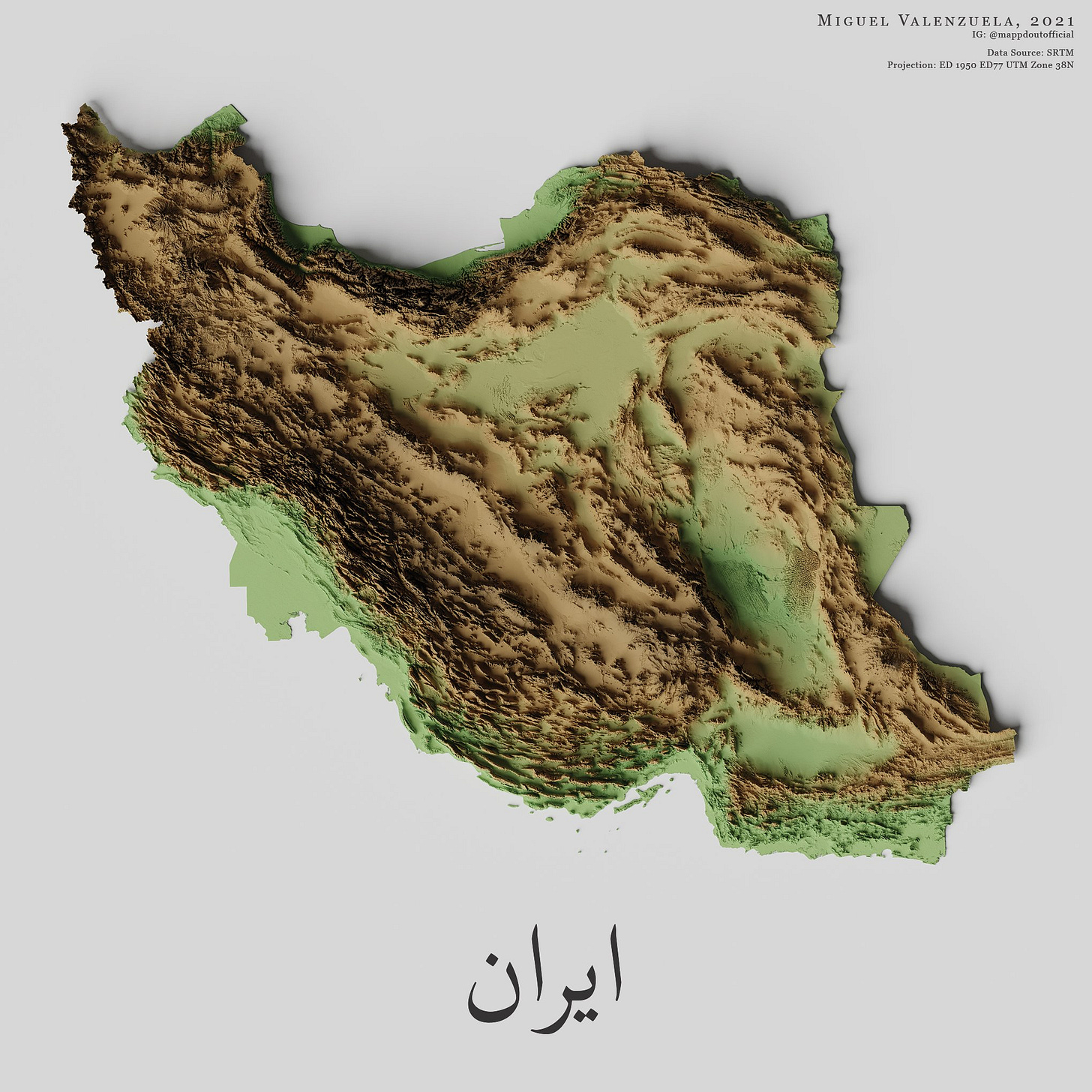
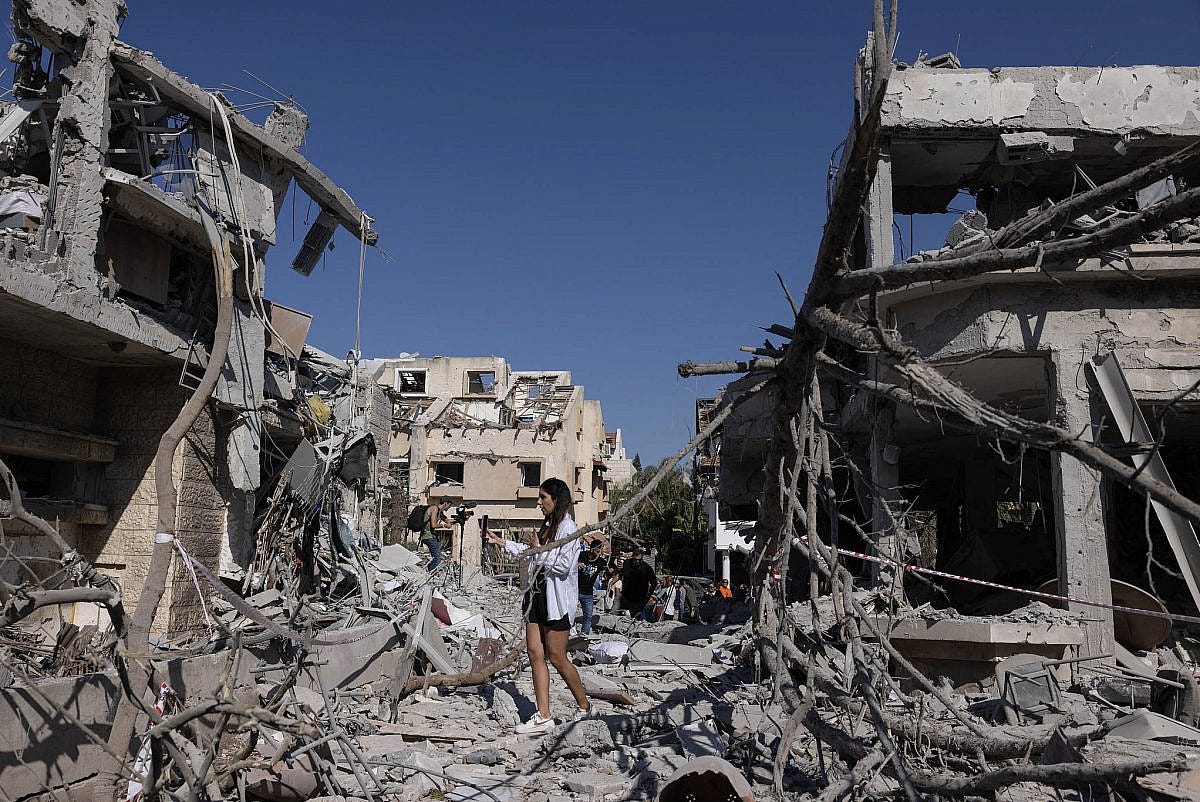


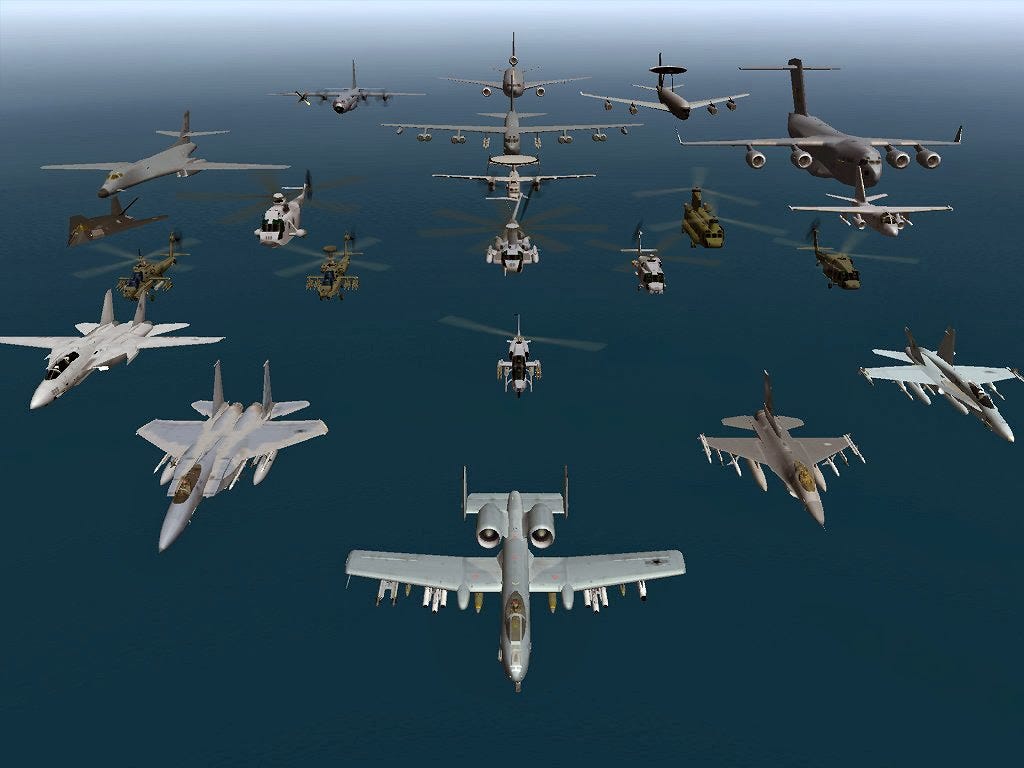

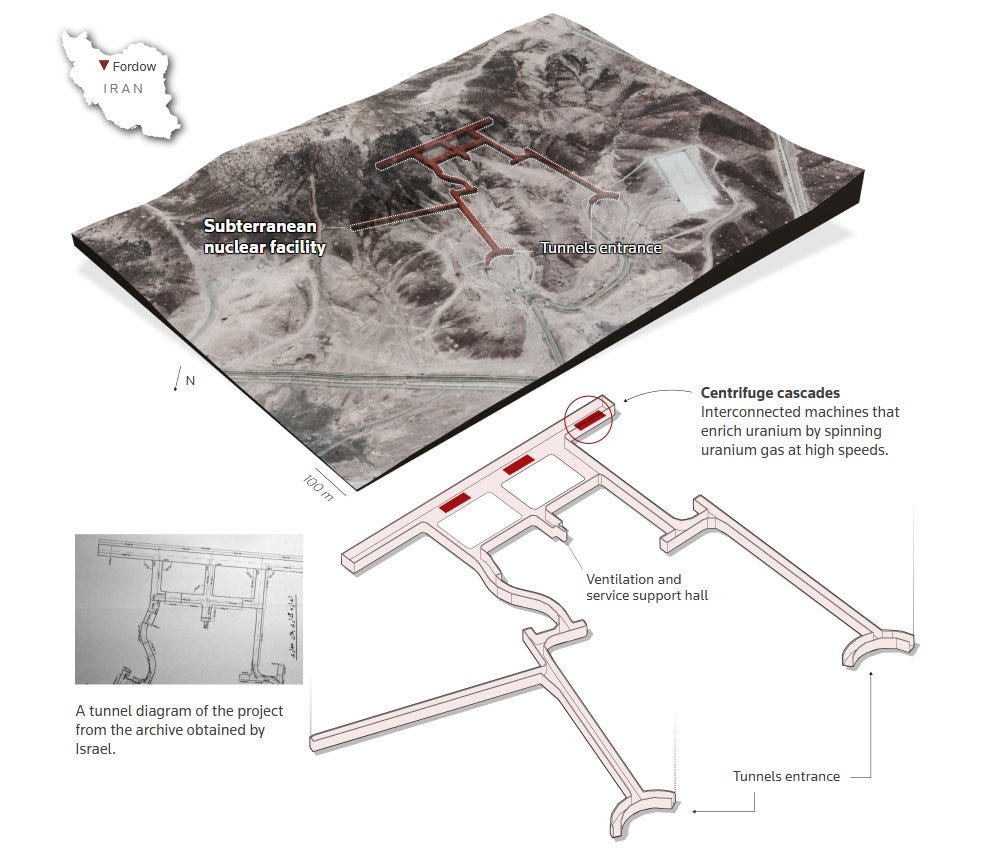

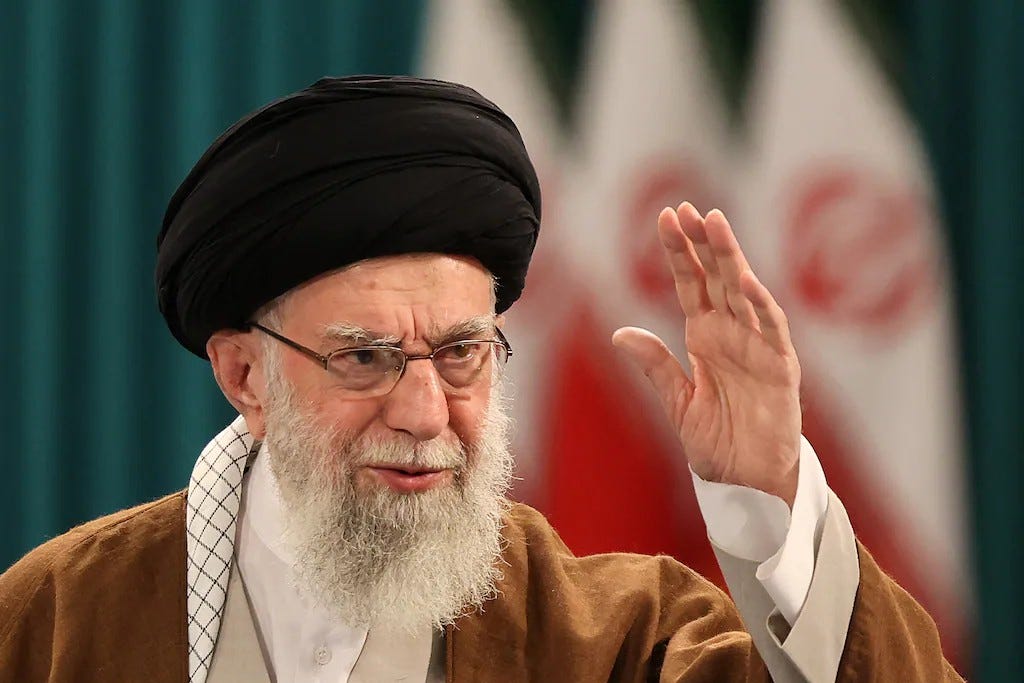
Great analysis. Though it would be counter to Iran's own self-image and objectives to use a nuke on Israel only to injure the Palestinians it has for so long sought to defend and protect.
MAGA is, first and foremost, a cult of personality. Emphasis on the word "cult". It doesn't matter what Trump does - they are for it, and are always ready to roll out the excuses when he fucks up or betrays them.